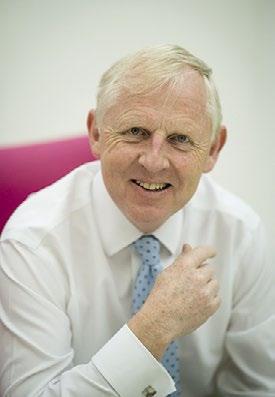
12 minute read
From one-man band to a million-pound business
In almost all cases, commercial mediation rather than recourse to the courts is the preferable solution to a legal dispute.
When a settlement bid is not a sign of weakness
Despite our best endeavours and sometimes through no fault of our own, we can find ourselves involved in legal disputes. Should you find your business faced with a potential dispute, recourse to the courts can be regarded as an option - and sometimes it is the necessary option - but possibly not the best solution.
Does your business really want to be involved in legal proceedings?
It is very important to understand what your business is getting involved in. It is almost always better to find a commercial solution to a dispute. Your business should consider: n The value of the claim, the costs involved and the implications of success or failure; n What your business is trying to achieve from the litigation process; n The time, cost and management commitment that will be required; n How it will affect your ongoing commercial relationships and the reputation of the business; n Whether there is a commercial advantage to the dispute; n What the effect will be for both parties if the dispute is made public; n Whether the other party will be able to pay up if you win; n All litigation is to some extent speculative (for example, how will the witnesses perform in the witness box?)
Is it possible to negotiate a settlement?
Your business should not consider it a sign of weakness to approach the other side to explore the chances of a settlement. This can be done at any time during the litigation process, even during a trial. Commercial mediations are increasingly common and are very cost-effective.
Always take legal advice first to ensure that any settlement discussions are conducted on a “without prejudice basis”. This means that anything said about the dispute during the settlement negotiations or in any written settlement offer cannot be used later at the trial. This protection only applies to statements made purely in an attempt to settle the case.
Peter Kelly Fiona Hewitt
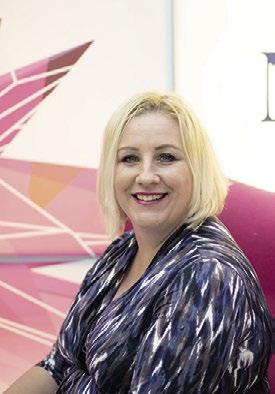
How Neves Solicitors can help
We take a practical approach to problem solving, focusing on our clients’ overall objectives. Peter Kelly and Fiona Hewitt have many years’ experience in a wide range of commercial dispute matters including debt recovery, breach of contract claims, injunctions, shareholder and partnership disputes, PR/media and reputation management, commercial landlord and tenant issues and land-related disputes.
Contact Peter or Fiona on 0330 0945 500 or email peter.kelly@nevesllp. co.uk or fiona.hewitt@nevesllp.co.uk
The green, green grass of home
In 21 years, George Davies Turf has grown from a one-man band into a multi-million pound business. Its founder talks to Business MK about the journey.
Fourth generation farmer George Davies intended to work on the family farm when he returned from university with an agricultural degree in 2000. But he knew he needed to supplement his salary with other incomes. Initially he looked into growing alternative high-value crops, like lavender, sage, peppermint and chamomile.
“But I soon realised that growing alternative crops involved a lot of investment, and it was high risk too. So I thought ‘What have we got here?’ Well, we have Milton Keynes on our doorstep and we are right in the middle of Bedford, Northampton and Wellingborough.
“I thought ‘What do these guys want?’ They are going to want trees, shrubs, plants and turf. Can we grow turf?”
He discovered the answer was ‘No’, due to the soil type and unsuitable irrigation on the farm. But there was no reason why he could not buy it from other parts of the UK and distribute it from the farm.
Thus George Davies Turf was formed. It sold 18,000 rolls in the first year and in those early days, when he was out on the road all the time, a wooden honesty box stood at the entrance to the farmyard at Olney for customers who preferred to collect. He estimates that in the ten years it took for him to stop driving and concentrate on developing the business, a total of £1 million was placed in this box.
Today George Davies Turf is a far slicker operation, employing 19 people. Since coming off the road, George and his team have taken it to the next level. At the time of writing the company has already sold 850,000 rolls of turf this year. It has also expanded into other related products, such as top soil, bark, compost - 8,100 bulk bags sold this year so far - decking and artificial grass.
“People say not to diversify too much from your core product but in a way our core product is our service,” says George. “And as long as that service remains at the forefront of what we are doing, it does not matter whether it is topsoil, turf or decking.”
By his own admission, George is a control freak. The business had George Davies Photo: Made In Blue
been operating for ten years before he recruited its first lorry driver.
“I was doing everything myself and was still heavily involved in the family farm. I thought I would kill myself or somebody else because I was doing stupid hours.
“I was petrified that I would never find anyone who could do the job as well as me and be as good with customers. I was not prepared to hand over the customer service to someone. And I needed someone to look after the lorry as well as I did. It was my pride and joy and looked fantastic. I did not want to hand it
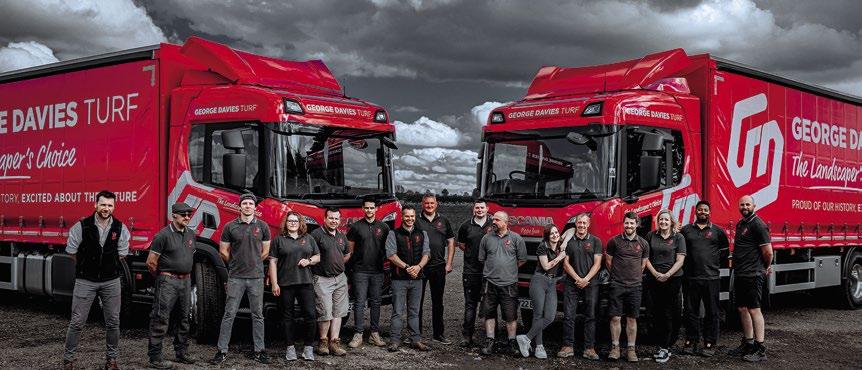
Rebrand reflects a new digital industry
George Davies Turf has just undergone an extensive rebrand. “The trucks are red, the website was green and we had blue uniforms so we were a bit of a mismatch,” says George. “We decided to keep the lorries red, as everyone recognises them, while the website and uniforms are now red and grey.”
More than just a fresh look and feel, the rebrand also reflects a desire to adapt to digital changes in the industry.
“We want to adopt more efficient online processes, to be the first turf provider in the country to launch an innovative new app to speed up purchasing and customer service and to make sure we become the trusted turf supplier for aspiring and upcoming landscape gardeners.”
The two 22-plate Scanias also feature a revised livery, which includes the phrase Proud of our History, Excited about the Future.
“I think the new livery looks great,” says George. “It is fresh, modern and suits our message as a forward-thinking business.
“We are on an exciting trajectory of growth as a company and our rebrand and eye-catching fleet pulls everything together to showcase where we are going.”
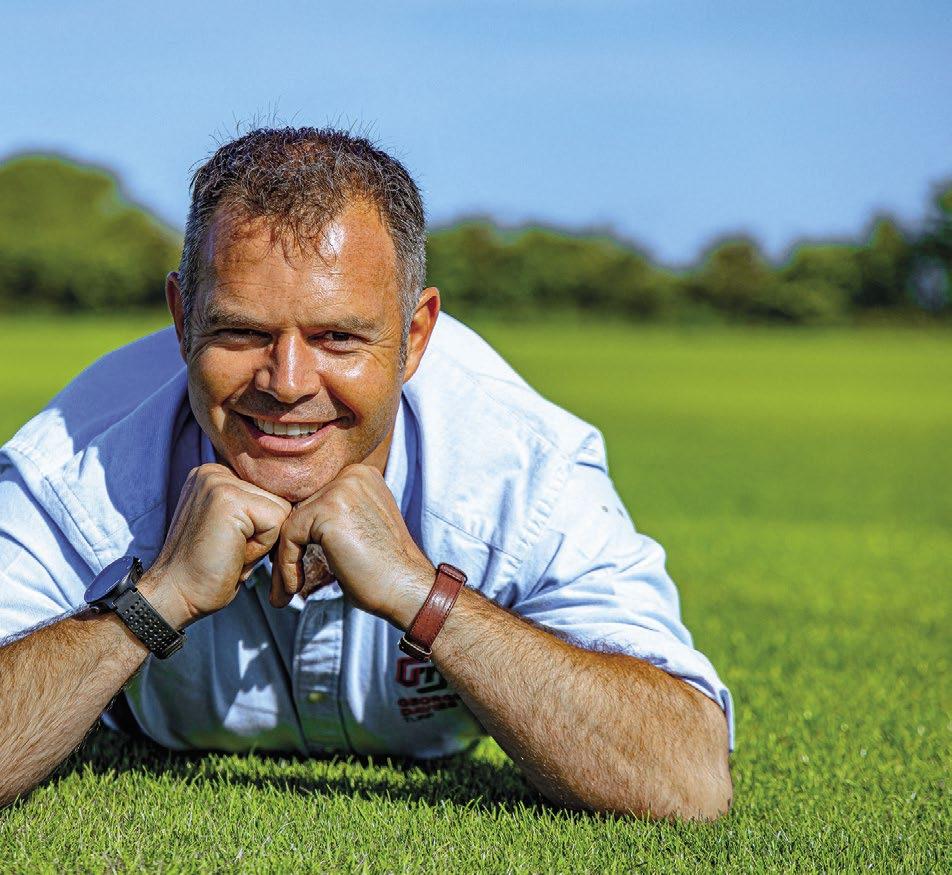
over, but I knew I had to.”
It turned out to be one of the best decisions he was to make, freeing up time to concentrate on other areas of the business.
Today George employs eight drivers and believes them to be great ambassadors for the company in their compliance, high levels of customer service and the way in which they look after the trucks. “Our drivers are up there with the best in the country.”
Head office is on the 350-acre Davies family farm but the turf it sells comes from sandy soil ground in Yorkshire and Lincolnshire. The company supplies to 3,000 customers, some who place an order once a year; others who require a daily delivery. But they all want the turf delivered on time, invariably at 8am.
“Because turf is the last piece of the project, timing is critical,” says George. “If you have lads sitting around on site and you are paying them good money and they have to sit there for six or seven hours until the turf turns up then they will lose a lot of money.
“What if it does not turn up until 4pm? It might take four hours to lay it so do they pay them overtime or do they send them home and hope the turf will still be okay the following morning? We try our hardest to meet our customers’ needs but when you are doing up to 300 timed deliveries a week within a two-hour slot, it can be a logistical nightmare.”
The turf’s very short shelf life does not help. Unless it goes into the company’s purpose-built chiller, which keeps it fresh for a few days, turf ideally needs to be laid within 36 hours of being cut.
“It is the same when you cut your grass and you leave the cuttings in the lawnmower. They get smelly and black very quickly,” says George. “A pallet of turf is basically a load of grass clippings with soil around it.”
Company image is hugely important to George Davies. It is a key reason why George Davies Turf runs such a well turned-out, predominantly Scania fleet.
The fleet’s eight trucks work hard. Between them they deliver 1.4 million rolls of turf a year, roughly the equivalent of 190 rugby pitches. However, it was a different story 20 years ago when the company was in its infancy. He started out with a Peugeot
306 car pictured towing a trailer,
before upgrading to a used 7.5-tonne Mercedes-Benz 811D. At this time George was making all the deliveries himself.
“We were shifting 25 tonnes per day and quite often I would have to hand-ball it off. I was as fit as a fiddle and as strong as an ox. But I was aware that my back and body would not withstand this punishment for years.”
The solution tcame in the shape of a used Volvo FL10 with 450,000 km on the clock, equipped with a Moffett forklift. A huge amount of time and manual labour could be saved but there was one small problem… George did not have a HGV licence. “I bought it before I had my licence because it came at the right money.”
George passed his HGV test in January 2004 and the next day drove to London in what he recalls as a “baptism of fire”. The truck clocked up a further 500,000 km before the first new lorry arrived, a Scania R-series, in 2008. This was followed by more new and used Scanias and Volvos, all either equipped with a Moffett or Manitou forklift. Today Manitou products now form part of all new additions to the fleet.
In 2020 the first new generation Scania P410 8x2 rigid was added to the fleet, since joined by three more supplied by TruckEast Northampton on repair and maintenance contracts. They are likely to cover some 900,000 km in ten to 12 years on the fleet.
Manitou has become George Davies Turf’s forklift supplier of choice largely due to its excellent reach. “My record was to rock up at the garden centre, pull the curtain back, demount the Manitou, take a pallet off, put the Manitou back on and close the curtain in just under two minutes,” George says.
“I was really going some but a three- or four-minute tip is common.
“I think the Manitous are invaluable. It is vital to make the drivers lives as easy as possible and that is what these do.”
Steve Rees, commercial director at full service marketing agency Square Media
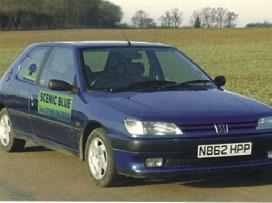
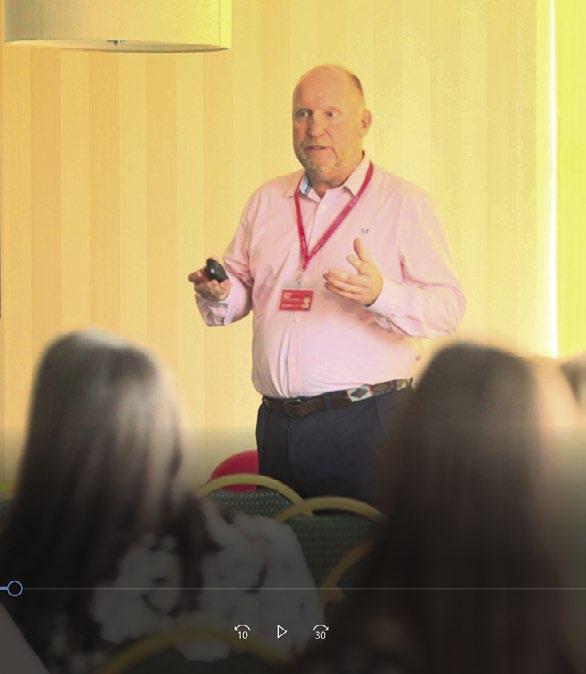
The world is changing... it’s time to take back control
Who knows what the future might hold but it is clear if you fail to plan you plan to fail writes Steve Rees, commercial director at Square Media. Daily pressures and demands can mean there is little time given to the big questions that will make a real difference.
Just take a moment to answer these simple questions. n Why do you exist? n What problems will you solve today? n Why do people buy from you?
If you do not have the answers or have not got time to come up with an answer, it is time to listen to those alarm bells.
The fact is the world is changing and businesses will need to adapt more than ever before to survive the next few years which are going to be tough.
Take back control. Create a marketing plan in a day at a workshop run by experts from Square Media working with people specialists HR Solutions.
At the end of the workshop each delegate will take away a workbook containing their bespoke marketing plan. The sessions will guide people through stages using a tool known as PESTLE.
Political: What political changes, and mandates are in place that will impact your business? So, what are the implications for your business?
Economic: What stage of the cycle are we entering? Recession threatens with low grown, highinterest rates, high inflation. So, what are the implications for your business?
Social: How do people behave and communicate; we are experiencing a social revolution right now around diversity and inclusiveness. So, what are the implications for your business?
Technological: Huge development here in digital, more work from home, selling online and through mobile, electrification. What are the implications for your business?
Legal: What’s coming down the track that could stop the way you do things…. So, what are the implications for your business?
Environmental: Climate change and sustainability is huge. So, what are the implications for your business? We will focus on: Purpose Help to determine why you exist, what problem you solve and why people buy from you; People Your audience and who you need to reach to fulfil your purpose; Plan This is the key part of your day: n Audience; n Message; n Media; n Data capture; n Nurture; n Conversion; n Onboarding and wowing new customers; n Upselling and cross selling; n Creating advocates for your business who generate fresh referral. Take back control. Create a marketing plan in a day at a workshop run by experts from Square Media working with HR Solutions. n There are a few spaces remaining for the next marketing workshop on October 26 at Kettering Park Hotel. Call 03303 801 651 to book yours.



